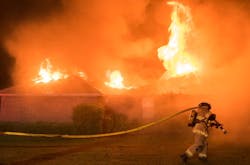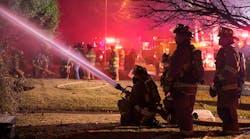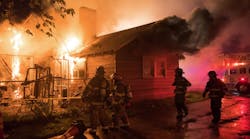Last month we shared the first 25 commandments of being an awesome firefighter.
I will repeat the introduction before listing commandments 26-50:
In 2017 and beyond, as a firefighter, in order to be the best subordinate I can for my supervisor, the best follower for my leader, the best teammate for my co-workers, the best employee for the fire department and jurisdiction that took a chance on me by hiring me and who I have entered into an employment contract with (which is a two-way street—they pay you a fair wage and offer reasonable benefits and you have the right to go elsewhere if you feel you can get better somewhere else; in return you are expected to do your job to the best of your abilities and perform the required duties and responsibilities of the position), and most importantly, do what I can to ensure I go home safely at the end of my shift so that I can see my family and friends, and eventually have a long and healthy retirement, I promise to do the following in no specific order.
- Learn the names and faces of our command team (fire chief, assistant chief, deputy chief, division chief, battalion chiefs, etc.). I realize I can just call them chief, but it doesn’t hurt to be able to know who they are (for good reasons, meaning I’m not on the bad boy or bad girl list for getting in trouble). For anyone who thinks this is not necessary, look in the mirror: do you expect them to give you respect and know your name? (You should!) If so, then respect is a two-way street. It’s not us versus them. It’s we’re all in this together and on the same team.
- Know the history of our fire department, and as much as I can about our department, so that I can share it with others.
- Not complain when I have to do something I don’t want to do, such as training outside when it is wet, cold, hot, etc., or when a sporting event is on TV that I want to see and my officer says turn the TV off and let’s go training or whatever else is meant to support our mission statement (of which watching TV is not, to the best of my knowledge).
- Come to my officer with solutions, not problems. Nobody, including officers, like problems dumped on their lap.
- Not make my officer do his or her job! Meaning, I won’t put them in a position of having to discipline me for something I should have done or never have done in the first place. If they do have to discipline me, I will remember that I put them in that position, and made them do their job.
- Learn from my mistakes, and do what I can to not make the same mistake twice.
- Notify my officer immediately if I damage something in the course of doing my job. I will also take responsibility for my actions, and do what I can to rectify the situation. I will also determine and share with my officer what I could do differently in the future to not allow the same damage to occur.
- Be professional and lead by example, walk the walk, and talk the talk. Even as a firefighter, I am a leader and someone who people look up to and look at, 24/7/365, both on and off duty.
- Be proud that I have the opportunity to serve in one of the greatest careers one could ever be fortunate enough to work in. I will never forget the excitement, passion and enthusiasm that (hopefully) came to me when I got that phone call or letter advising me I got the job
- Do what I can to leave the fire service and the fire department and community I serve, better than I found them. One bite at a time, continuous quality improvement and paying it forward are rules I will live by.
- Mentor and train those members junior to me, or our volunteer or explorer firefighters, once I get seniority, which won’t be long in many departments.
- Treat the firehouse like it is my own house; I will do what I can to take care of it, clean it up as needed, and take ownership of it to make sure it is in the best condition possible. This means I will turn off lights not in use, or turn off the TV if no one is watching it, and secure it as appropriate.
- Not question the tough decisions my officer has to make, such as when he or she says we are not going inside the structure to fight fire (meaning we are going defensive), or when we are inside and we have to vacate immediately based on his or her gut feeling or intuition, or actual knowledge based on their assessment of the situation. I realize there is a time and place to go offensive and inside, and there is a time to stay outside. Now I realize there are some that say ALL fires are rescues until proven otherwise and that we always have to be aggressive and that it is OK to kill a firefighter for property or a vacant structure, but I will respectfully disagree here. Call me what you want, but I guess I care too much about my brother and sister firefighters. Don’t get me wrong, there are times we may lose our lives in the course of attempting to save a savable life (as determined through our size-up, risk management, survivability profiling, etc.), but when it is beyond a reasonable doubt there is a savable life inside, and my officer says we are not going interior, I will respect that decision and not make them feel bad or think they made the wrong decision.
- Stop at red lights and stop signs when responding to emergencies, if I am the driver; I will also obey all of the traffic laws including wearing my seatbelt, not speeding, and not driving recklessly like I own the road (I don’t).
- Eat healthy, and make time every shift for some form of physical fitness. If for some reason the day gets busy, I will attempt to at least get a workout in at night before going to sleep, and definitely make the time off duty to keep myself in shape.
- Expect to be held accountable for my actions or non-actions, and not complain when I am being held accountable.
- Hold myself to a high standard, both off duty and on duty.
- Not screw up a great career, by doing something stupid, illegal, unethical, or inappropriate, either off duty or on duty.
- Remember I am always representing the fire service, the department I am fortunate to serve, and the community I am fortunate to serve, both off duty and on duty.
- Remember that I am always on stage, both on and off duty. Someone is always watching or filming what I am doing. It’s amazing how many fire service personnel forget this concept and end up doing things that get themselves in trouble or just make the fire service as a whole look bad. Twenty years ago, before smartphones, the Internet and social media, this wasn’t too big of an issue. However in today’s world, everyone has a camera or device that can take a video, and they are filming what we are doing and posting it on the Internet or social media in moments, even before we get back to the firehouse! I will always have my “edit feature” working when I say something, realizing nothing is ever off the record and that somebody may be recording me in some form or fashion.
- Responsibly use social media, so that I never embarrass myself, my department, my community, or the fire service in general. I will do my best to not have any pictures taken of me should I find myself in compromising situations or situations that may embarrass myself, the department or the fire service in general.
- Stay up-to-date with my fire service, by reading fire service publications (such as Firehouse) by subscribing to the numerous free email lists such as www.firehouse.com, www.firefighterclosecalls.com, www.dailydispatch.com, and by paying attention to what is on Twitter, Facebook, etc., and just staying engaged with your fire service by locating credible information from the Internet.
- Never put my officer in a position that could affect his or her employment, by asking them to do something illegal, unethical or just inappropriate.
- Take care of my crew and my officer, not to mention my other co-workers, as best as I can. I will look out for them and their best interests at all times, even if it means saying or doing the unpopular thing just to keep them out of trouble, safe and healthy.
- Learn as much as I can about my fire service. This may mean completing my degree in fire science or fire technology, attending courses or workshops and/or obtaining state certifications in firefighting and the related fields that our job may find us doing on any given day, and being a life-long student of the craft.
Commandments 1-25 of an Awesome Firefighter and Commandments 51-75 of an Awesome Firefighter.








